Why You Should Link to Other People’s Content From Your Blog (and Eight Ways to Do It)

How often do you link to other blogs and websites from your own site?
You might be mainly concerned with building links within your site, to your own pages – or building links from other people’s sites back to yours (whether that’s through guest posting or outreach).
But linking out to other people’s sites has a whole bunch of benefits:
- It helps them, by signalling to Google (and other search engines) that their site is trusted.
- It helps your readers, by pointing them toward great content that they might not otherwise have known about.
- It helps you, by giving Google more clues about what your blog covers. (It can also be a great way to build relationships with other bloggers).
We’re going to dig into each of those in more detail in a moment – but first, let’s look at some common objections to linking out.
Why You Might NOT Want to Link to Other People
You might feel reluctant to link to other people’s sites or resources. Perhaps:
#1: You’re Concerned About Losing Readers
Many bloggers worry that if they link to someone else’s post, their readers might head to that site and never come back.
This isn’t a good reason to avoid linking out. (After all, if your content isn’t interesting enough for readers to bother coming back, they probably weren’t going to stick around for long anyway.)
Some blogs try to avoid losing readers by having all external links (links to sites other than their own) open up in a new tab. I’m not keen on this: it can be irritating for readers, because it can’t be overridden. If you use regular links, readers can opt to open them in a new tab if they don’t want to lose their place on your site.
#2: Their Blog Looks Better Than Yours
If you feel that your blog looks a bit amateur, then linking out to the big players in your niche might feel a little intimidating. Perhaps you’re worried that you’ll look bad by comparison.
The good news here is that people reading your blog have, most likely, come across many of the big sites in your niche already. They might enjoy your quirky design and your low-key style. Sure, if there are obvious issues with your blog (like you’ve plastered it in ads or one of your plugins is causing a prominent error message) then you’ll want to fix those, but don’t worry if your site simply doesn’t look super-slick.
Again, linking out isn’t going to – in itself – make readers leave due to your less-than-stellar design. The design itself will do that!
#3: Their Blog Isn’t One You’d Want to Promote
This is the one good reason to avoid linking out: because the content you’re considering linking to is on a website that you don’t want to be associated with (and/or that you don’t want to support in any way).
A few years ago, I wrote a post for Aliventures called Why Writers Should Fear Obscurity, Not Piracy.
I wanted to quote from some other self-publishing authors, so I did a quick Google search on this topic. One of the sites I stumbled across had a post that I agreed with, but something about their site raised a red flag. I explored a little further, and came across some horrifically and explicitly misogynistic views in the blogger’s other posts.
Unsurprisingly, I decided that there was no way I was going to quote or link to that blogger. I found someone else to quote and link to instead.
Why You Should Link to Other People
In almost all situations, linking to other people is a great thing to do. Let’s take a deeper look at why:
Linking Out Helps Other Bloggers
One of the things I’ve loved most about the blogging world, since I started blogging in 2007, is that it’s a collaborative medium. Bloggers often build on ideas from one another, giving credit where it’s due.
Linking out helps other bloggers: it can send them traffic directly from your blog, but it’s also important because (all else being equal) the more links there are to their site, the higher they’ll rank in Google.
This doesn’t just go for blogs, of course. If you’re linking to a book, that helps the author: you might well be sending them not just a few new readers but also some new fans. If you’re linking to a freebie, you might be providing a nice boost to someone’s email list.
One great way to really help other bloggers with traffic and with their search engine optimisation is to link to them from your guest posts – that way, you’re leveraging the audience and authority of a larger blog on their behalf.
Linking out Helps Your Readers
How did you come across your favourite blogs? It might have been through a Google search – but it might well have been through someone else’s link or recommendation. I can name a whole bunch of blogs that I first found through following a link on someone else’s site – and those blogs have been hugely helpful to me.
Linking to content that’s more beginner-friendly or more advanced than your own post can be really helpful, too, as it helps readers find exactly what they need.
The same goes for other resources: many of the business books I’ve got on my current “to read” list are ones that I’ve come across linked to from someone’s blog.
Linking Out Helps You
If you’re wondering what’s in it for you … well, linking out should help you too. It positions you as an authority in the eyes of your readers: someone who knows what else has been written on their topic, and who can point them to useful resources.
It also makes you a valuable friend for other bloggers. While, of course, you won’t find that every single link leads to a new blogging relationship, at least some of your links should help you to foster connections. You may well find that bloggers stop by to comment and say “thanks!” for linking to them.
Linking to lots of other sites that are related to yours, too, helps Google to figure out what your site is about … potentially leading to you ranking more highly for key search terms.
If you’re linking to specific products or sales pages, you might also be able to get some affiliate commission from any sales that occur as a result.
Eight Ways to Link to Other People
When you’re in the middle of writing a post, it might not occur to you to include a link. I often go back and add links when I edit, or I’ll note places while drafting where I want to link out.
Some good opportunities to look out for are:
#1: When you mention a particular idea or topic in passing that you won’t be covering in detail – you can use part of the sentence as your link.
Example:

(From earlier in this post!)
#2: When you quote someone. It’s always good practice to not only name the person but also link to the source (unless you’re using a very well-known quote).
Example:
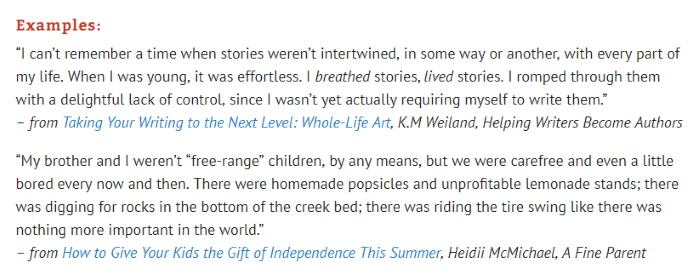
(From Five Easy Ways to Write in a More Conversational Style)
#3: When you want to offer further reading on a particular topic. In this case, it often makes sense to use the title of the post as the link.
Example:

(From Seven Ways to Write Better Blog Posts (Plus Seven Bonus Links))
#4: When someone else’s post has inspired yours – it’s normally a good idea to acknowledge this and link to their post in the introduction to yours.
Example:
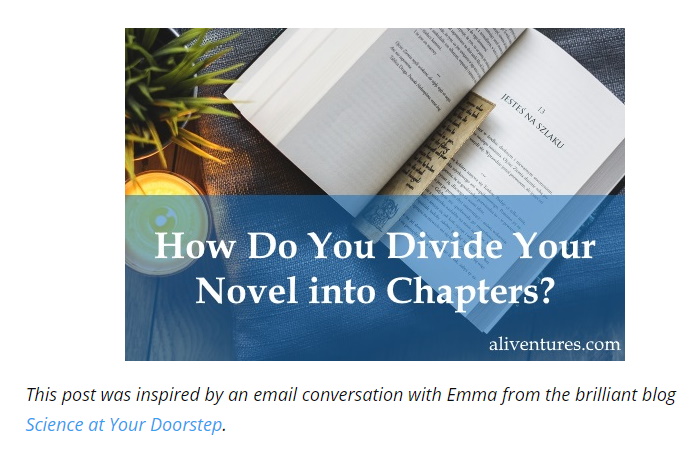
(From How Do You Divide Your Novel Into Chapters?, Aliventures)
#5: When you interview someone. You might use their name as the link, or give the URL of their site.
Example:

(From Interview with Author K.M. Weiland – Character Arcs, Jason Farley, CrossPolitic Studios)
#6: From a roundup post where you’re linking to several recent posts that you’ve enjoyed reading – I publish these weekly on Brighter Blogging.
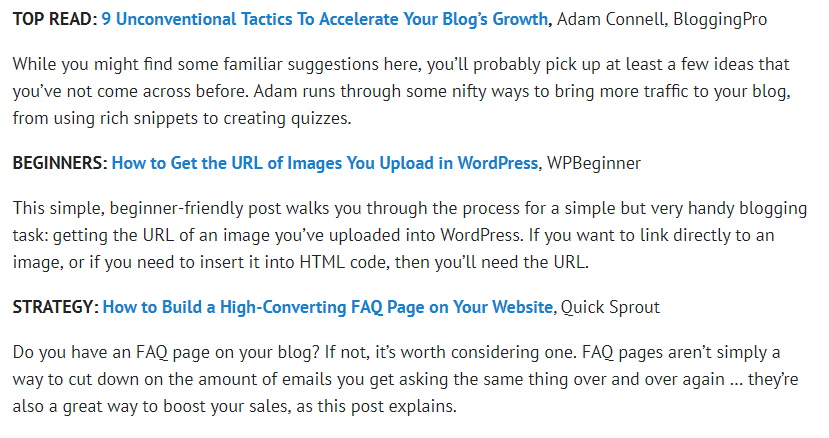
(From Brighter Blogging Roundup: Friday 2nd August)
#7: From your sidebar, in a “blogroll”, “links” or “favourite blogs” section, if that suits your personal style and matches what others are doing in your corner of the blogging world. (I don’t see this happening much these days, but it’s still an option.)
Example:
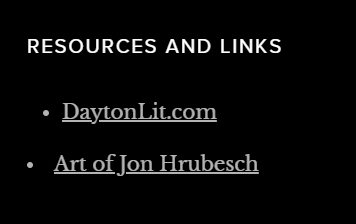
(From After Terra)
#8: From a resources page, where you might be linking to posts, books, tools, products, and so on.
Example:
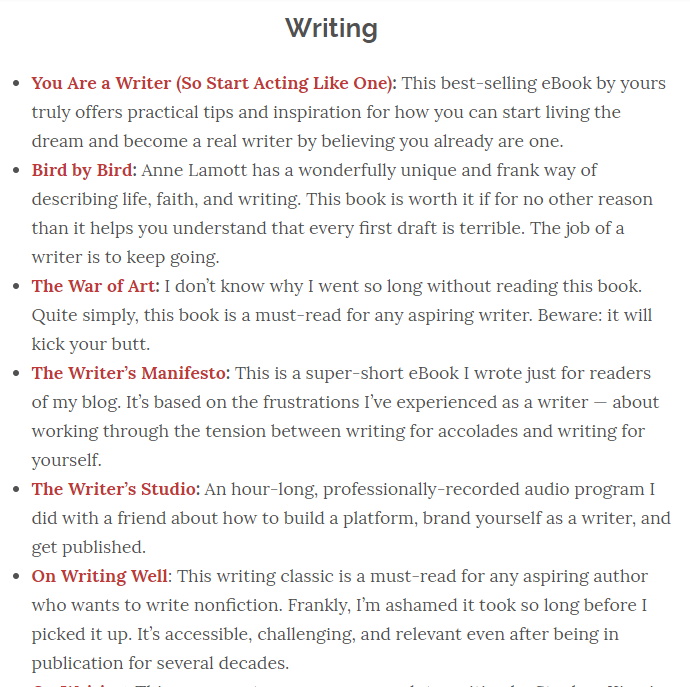
(From Writing Resources, Jeff Goins, Goins, Writer)
With every post you write, look for at least one opportunity to link out to other people. It’ll almost always be possible, and it can be a great way to share some link-love around.

Hey Ali,
This is absolutely the only and best article I found on this topic. So, thank you very much for showing us the right path.
Sometimes, I also feel hesitation to link to a huge blog, but I just wanna give only the best for my readers.
You have explained everything pretty great. Now I can link out to useful articles without any hesitation.
Thank you very much for sharing this with us.
Keep it up.